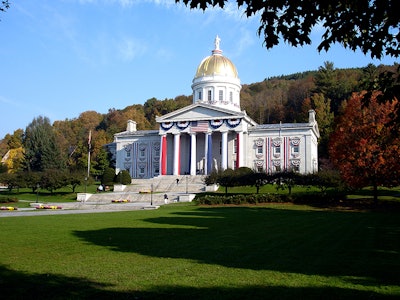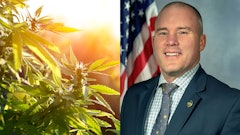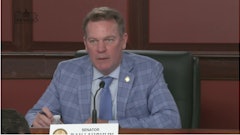
UPDATE (May 24): Gov. Phil Scott Vetoes Historic Bill That Would Have Made Marijuana Legal for Adults in Vermont
In a state senate vote of 79 yeas to 66 nays, Vermont became the first state to pass an adult-use legalization bill without a referendum on May 10.
S. 22—a bill first introduced by the Senate in January to increase the penalties for possession, sale and dispensation of fentanyl—was amended by both the House and the Senate in May to include marijuana-related language from previously failed bills H. 170 and H. 167. The revised version of S. 22 includes:
• Amendments relating to the elimination of penalties for possession of 1 ounce or less or marijuana, and limited home cultivation;
• An updated definition of the term “Marijuana”;
• Creation of a state “Marijuana Regulatory Commission,” to set up framework for legalizing and licensing the marijuana market, made up of members of the House, Senate, governor’s office, Agriculture, Food and Markets department, and the public. Guidance will be due Nov. 1, 2017.
“80,000 Vermonters are proof that burying our heads in the sand has not proven effective in limiting the black market. Moving toward a regulated market will improve our ability to protect and educate our youth. That’s why I voted yes,” said Representative Theresa Wood (D-Washington-Chittenden) in an explanation of her stance to the Journal of the House.
According to a press release published by the Marijuana Policy Project, citing a statewide survey of 755 registered voters conducted in March by Public Policy Polling, “57 percent of Vermont voters support allowing adults 21 and older to possess and grow limited amounts of marijuana,” and “only 39 percent are opposed.”
In an interview with Vermont Public Radio (VPR) on Friday, May 12, Republican Governor Phil Scott said he hadn’t yet read the bill, or decided whether or not he will sign S. 22 into law. While Scott isn’t “philosophically opposed,” to legalization, citing a “libertarian streak” in his ideals, he expressed concern about impaired driving on state highways, as well as children’s access to edibles–issues the Marijuana Regulatory Commission is likely to address.
RELATED: Vermont Cannabis News
“This bill is a compromise between the House and Senate,” said Laura Subin, the director of the Vermont Coalition to Regulate Marijuana, in an interview with Cannabis Business Times. “The House wanted legalization only and was not ready to focus on regulated sales. The Senate very much wanted the full regulated industry and a plan for the revenue to go to things like highway safety and to come before legalization. So in the final version, the compromise was [that] it did legalize before regulation, but it also pushed the effective date out for another year so that if the bill passes, marijuana won’t actually be legal in Vermont until July of 2018, so I think that was important to the Senate to give them time until next year to work through this commission that’s also contained in the bill to develop a proposal for taxed and regulated sales.”
And while there is no language in the bill about potential canopy sizes, license caps or application fees, Subin believes the commission will look to legislation currently in committee for guidance, such as H. 490, which states that:
Prior to July 1, 2019, provided applicants meet the requirements of this chapter, the Agency shall issue:
(A) an unlimited number of cultivator licenses that permit a cultivation space of not more than 500 square feet;
(B) a maximum of 20 cultivator licenses that permit a cultivation 2 space of not more than 1,000 square feet;
(C) a maximum of eight cultivator licenses that permit a cultivation 4 space of more than 1,000 square feet up to 2,500 square feet;
D) a maximum of 20 cultivator licenses that permit a cultivation 6 space of more than 2,500 square feet up to 5,000 square feet;
(E) a maximum of six cultivator licenses that permit a cultivation 8 space of more than 5,000 square feet up to 10,000 square feet;
(F) a maximum of five testing laboratory licenses; and
(G) a maximum of 42 retailer licenses.
Gov. Scott estimated in an interview with VPR that it will be a week or two before his office receives the bill from legislative review, then he will have five days to sign it, let it go or veto it. “This could take a bit of time,” Scott said.
In the meantime, Subin is proud of the accomplishment the state has made thus far. “Vermont prides itself on a progressive history and the willingness to step forward and go first on social reform,” she said. “We were the first state to legalize civil unions, so I think it is a point of pride with Vermonters. We like getting there first when we know that it’s the right thing to do.”

























